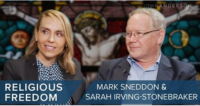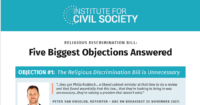ICS supports NSW Bill on Religious Discrimination and unpicks erroneous criticism that the Bill preferences religion. Mark Sneddon appeared before the Committee on 23 October to speak to the submission.
PDF available here.
The need for Religious Discrimination Legislation in NSW now
Australians who regularly practise their religion are in a minority. Those who follow traditional religious practices on matters like sexual ethics, marriage, sanctity of human life, prayer and fasting or religious dress are an unpopular minority in some quarters. Like other minorities, they experience discrimination, but they don’t have the same legal protection as other minorities in NSW.
Federal, State and Territory anti-discrimination laws all prohibit discrimination based on race, gender, disability, age, sexual orientation and gender identity. But Australians who suffer discrimination based on their religious belief or activity have no federal anti-discrimination law protection, limited Fair Work Act protection, and no protection in NSW or in South Australia (except for religious dress).
More than 20 years ago, the New South Wales Law Reform Commission recommended the inclusion of religion as a protected attribute in NSW anti-discrimination legislation.
This lack of protection for people from discrimination in NSW on the basis of their religious belief or activity based on religious belief needs to be remedied now. For people like Soaliah, a young Sydney Muslim woman who was allegedly refused entry to a hotel unless she removed her hijab, and Madeline, a young Christian woman who was sacked for saying it was OK to vote against same sex marriage.
The Bill addresses the real problem of people being suspended, sacked or disqualified or refused qualification for reasonably expressing their religious beliefs. There are many real-life examples at https://australiawatch.com.au/ including:
- Andrew, a university student, suspended from his course after consensually praying with a fellow student; and.
- Patricia, a medical practitioner with over 20 years’ experience in sexual health who gave a talk for the Bible Society to a group of Christian teenagers about sex from a Christian perspective in which she advocated Christian teaching of people not acting on sexual desires outside of man-woman marriage. She was told by her professional association that her talk had failed to show respect for people with same-sex attraction and she must either give up her honorary life membership or never make those comments again. For the same reason her university department removed her from student supervision and stopped inviting her to any university meetings.
The Ruddock Expert Panel on Religious Freedom received over 15000 submissions and recommended that New South Wales and South Australia and the Commonwealth should amend their anti-discrimination laws to render it unlawful to discriminate on the basis of a person’s ‘religious belief or activity’ including on the basis that a person does not hold any religious belief and that they provide for the appropriate exceptions and exemptions, including for religious bodies, religious schools and charities.
Assessment of the Anti-Discrimination Amendment (Religious Freedoms and Equality) Bill 2020 (NSW)
This Bill is a thoughtful implementation of the Ruddock Panel recommendation for NSW and the Institute for Civil Society supports the Bill.
The Institute has seen the submission the Anglican Diocese of Sydney to this Inquiry and supports the analysis and comments in that submission in support of the Bill.
ICS has made detailed submissions on the Commonwealth Religious Discrimination Bill Exposure Draft (see http://www.i4cs.com.au/second-exposure-draft-of-the-religious-discrimination-bill/). In a number of respects the NSW Bill is superior to the current Commonwealth Religious Discrimination Bill Exposure Draft, for example by adopting the Siracusa Principles for balancing the human right of freedom of religion and belief with other human rights like the right to be free from discrimination.
Unpicking the Criticism of the Bill as a Preferencing of Religion
ICS notes that some groups have criticised this Bill as preferencing religion. For example Equality Australia says “its provisions entrench the ability of religious schools, charities, and other faith-based organisations to discriminate on the basis of someone’s religion (or lack thereof) in the provision of services, education, and employment”. Equality Australia adds that it “is very concerned by the introduction of legislation that entrenches double standards. This Bill threatens to undermine equality and could cause real harm, particularly for LGBT people, women, the unmarried and divorced, and people with different beliefs to the faith-based organisations they interact with”.[1]
This criticism is erroneous. It is erroneous because the Bill is only about discrimination on the grounds of religious belief (or its absence) – it provides no protection for anyone to discriminate against any person because of their LGBT attributes, their gender or marital status.
Religious Discrimination by Religious Ethos Organisations in Membership, Staffing (including Contracting and Volunteering) and Education Services
The Bill does provide protection for religious organisations to preference or discriminate on the grounds of a person’s religious belief or activity (or lack thereof). But when it comes to membership and employment that is entirely unremarkable. Religious ethos organisations, like political parties and other ethos based organisations, must have the right under anti-discrimination law to prefer as members or employees those who believe in and will act in support of their ethos. Otherwise they are forced by law to hire as employees and admit as members people who are opposed to and may actively undermine the ethos of the organisation. Just as a political party should not be compelled by law to have or retain as a member or an employee a person who is opposed to and works against its political beliefs and activities, so too a religious ethos organisation.
In those jurisdictions where discrimination on the grounds of political opinion is unlawful there is an exemption for political parties and employers permitting them to preference or discriminate in hiring and membership and required conduct on the basis of a person’s political opinion and activities,[2] just as there is for religious organisations to preference or discriminate in hiring and membership and required conduct on the basis of a person’s religious belief and activity. We can call it “preferencing” or “discrimination” but it is just what ethos-based organisations have to do to ensure their ability to maintain their ethos.
This is not a “double standard” or a preferencing of religion over other rights as Equality Australia suggests. One would expect that Equality Australia and the Sydney Gay and Lesbian Mardi Gras also discriminate in that they do not accept and would not retain as members or employees people (whether religious or non-religious) who are actively opposed to the celebration and promotion of LGBTI lifestyle and issues. And neither should they be forced by law to do so. It just wouldn’t work. By the same token, neither should religious organisations be forced by anti-discrimination law to accept or retain as members or employees people who are actively opposed to the beliefs, lifestyle, activity and mission of the religious organisation.
The same is true of religious-ethos educational institutions and managing the conduct of staff and students. Although religious-ethos schools will be sensitive to and care for students who ask challenging questions and test boundaries of behaviour, such schools must have the right to require students to conform to codes of conduct which reflect the religious ethos of the school. The schools would lose their religious ethos if the law gave students protection to actively undermine the religious ethos of the school. Existing provisions in the Act already permit religious-ethos schools to do this. If there were schools set up to promote a gay and lesbian affirming ethos, they too should have the same right to protect their ethos by having and enforcing codes of conduct to prevent staff and students from actively undermining that ethos of the school.
The Bill in proposed sections 22M and 22N appropriately provides this ability for religious ethos organisations to protect their ethos by preferencing for compatible religious belief and activity in membership, hiring, education services and codes of conduct for members, staff and students.
This is not a double standard. The Bill recognises that religious people need protection for their other important human rights in addition to the right to non-discrimination, like the right to freedom of association to associate with those you choose to and not associate in voluntary associations with those you don’t choose to (ICCPR Article 22), which is applicable to all associations, not just religious ones.
The Bill also recognises the practical importance of religion and religious organisations in the Australian community and the importance of freedom of religion which is an individual and a group right (ICCPR Article 18 and 27).
ICCPR Article 18 provides
- Everyone shall have the right to freedom of thought, conscience and religion. This right shall include freedom to have or to adopt a religion or belief of his choice, and freedom, either individually or in community with others and in public or private, to manifest his religion or belief in worship, observance, practice and teaching.
- No one shall be subject to coercion which would impair his freedom to have or to adopt a religion or belief of his choice.
- Freedom to manifest one’s religion or beliefs may be subject only to such limitations as are prescribed by law and are necessary to protect public safety, order, health, or morals or the fundamental rights and freedoms of others.
Freedom to manifest religious belief may be subject to limitations but only to such limitations as are prescribed by law and are necessary to protect public safety, order, health, or morals or the fundamental rights and freedoms of others.
- The States Parties to the present Covenant undertake to have respect for the liberty of parents and, when applicable, legal guardians to ensure the religious and moral education of their children in conformity with their own convictions.
Article 27 provides:
In those States in which ethnic, religious or linguistic minorities exist, persons belonging to such minorities shall not be denied the right in community with the other members of their group, to enjoy their own culture, to profess and practise their own religion, or to use their own language.
Religious Discrimination by Religious Ethos Organisations which hold themselves out as Supplying Non-education Services to the General Public
The criticism may have some merit when it comes to religious ethos organisations which hold themselves out as providing services to the general public (as opposed for example to providing services primarily to a religious community) but excluding education services (for the reasons discussed above).
In that case, proposed section 22M might need some modification so that a religious ethos organisation which holds itself out as providing services (other than education services) to the general public is subject to the Act’s requirements not to discriminate among recipients of those services on the basis of the recipient’s religious belief or activity or lack thereof. We know of no religious ethos organisations which discriminate in such a way in the provision of their welfare or other services for the general public but in principle the Act should apply to the offering of services by religious ethos organisations to the general public. However any amendment must ensure that an individual religious believer in the religious ethos organisation is not forced to engage in or affirm conduct which is contrary to their genuine religious beliefs – that would be religious discrimination against that religious believer.
The details of such a modification can be discussed further, but it involves a relatively small tweak to clause 22M of the Bill.
The much bigger picture issue is that NSW (and South Australia) stand alone as the only Australian jurisdictions which do not protect Australians from discrimination on the grounds of their religious belief or activity or lack thereof. There is no good reason for this. Their failure leads to a failure of protection for their residents under the Fair Work Act also. It is high time that failing was fixed in NSW and this Bill is a very good way to do that.
If the Committee would like further written submission or an oral submission in hearings, the Institute for Civil Society would be pleased to provide these.
[1] https://equalityaustralia.org.au/wp-content/uploads/2020/06/Explainer-on-One-Nation-Bill-1.pdf
[2] E.g. Equal Opportunity Act 2010 (Vic) Section 27: An employer may discriminate on the basis of political belief or activity in the offering of employment to another person as a ministerial adviser, member of staff of a political party, member of the electorate staff of any person or any similar employment. Section 66A: A club, or a member of the committee of management or other governing body of a club, may exclude a person from membership on the basis of political belief or activity if the club was established principally for a political purpose.








Recent Comments